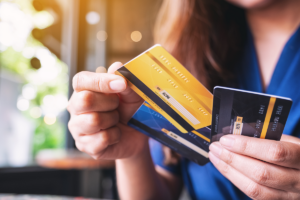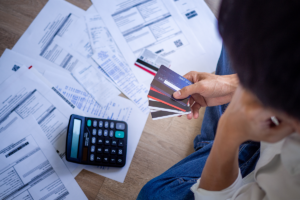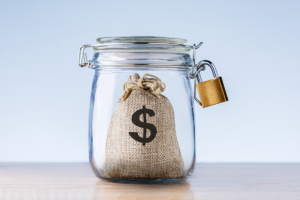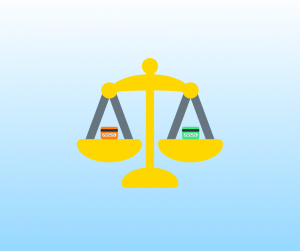How to Avoid Credit Card Debt

Is There Such a Thing as Too Much Credit?
10/19/2023
Are There Negative Items That Can Stay on Your Credit Forever?
10/30/2023Credit cards come with high interest rates that make it easy to slide into credit card debt. Even if you make on-time payments each month, sticking with the minimum payment can make for a long repayment path.
While it’s relatively easy to slip into credit card debt, it’s a challenge for many to pay off this kind of debt. High interest rates make repayment an uphill battle. With that, it’s best to completely avoid credit card debt if you can.
Let’s explore how you can use credit cards without derailing your financial plans through credit card debt.
How Common Is Credit Card Debt?
The reality is that it’s easy to find yourself in credit card debt. And according to a recent GOBankingRates survey, most Americans have some amount of credit card debt. Here’s the breakdown of credit card debt levels for Americans:
- 30% of Americans have between $1,001 and $5,000 in credit card debt.
- 15% of Americans have $5,001 or more in credit card debt.
- 6% of Americans have more than $10,000 in credit card debt.
Based on the numbers, over 14 million Americans have over $10,000 in credit card debt. Regardless of the amount that they owe, 33% of Americans believe it will take more than two years to pay off their credit card debt. And 3% of credit card debt holders don’t believe they’ll ever pay off the debt.
And it seems that many Americans hang onto credit card debt for a long time. For example, 15% of Americans have been in credit card debt for 15 years.
The root of the problem is that nearly half of Americans are leaning on credit cards to cover basic living expenses. With high inflation putting pressure on wallets across the country, it’s not surprising that 45% of Americans have taken on more credit card debt since March 2020.
While these statistics might be frightening, they shed light on how prevalent credit card debt is in America. If you find yourself in credit card debt, it’s comforting to know that you aren’t the only one.
Why Is Credit Card Debt Bad?
Not all debt is bad debt. But most financial experts consider credit card debt to fall squarely into the “bad debt” category.
Here’s a closer look at the reasons by credit card debt is often a bad thing for your finances.
Easy to Overspend
When you open an unsecured credit card, you’ll unlock a credit limit. With the card in hand, you can spend up to the limit with your credit card, and a high limit makes it easy to overspend by swiping your card.
If you sign up for a credit card with a high limit before mastering financial discipline, then you might be in danger of racking up credit card debt. In order to use credit cards responsibly, you’ll need to spend only what your budget can handle, not up to your credit limit.
Notoriously High Interest Rates
Credit card companies are notorious for attaching high interest rates to this convenient spending option. Higher interest rates mean that your credit card balance will grow faster. Even missing one payment could allow your credit card debt to grow faster than you can keep up with.
In the fourth quarter of 2022, the Federal Reserve reported that the average interest rate on credit card accounts that assessed interest was 20.40%. In contrast, the average interest rate on a personal loan was 11.21%. With sky-high interest rates, it’s easy to see how your credit card debt could quickly grow out of control.
Drain on Your Finances
If you get stuck in credit card debt, the balance can be a real drain on your financial situation. With high interest rates and plenty of fees involved, it’s often a significant mountain to climb. As you focus on keeping up with your credit card debt, other financial goals can fall by the wayside. For example, you might have to put your savings goals on pause or hold off on paying down other debt while you try to wrangle your credit card debt. All of these choices can represent a long-term drain on your finances.
Stress
When you are facing credit card debt, you may feel your stress levels mounting. Unfortunately, paying off credit card debt can be a very stressful journey. Life tends to throw other unexpected expenses your way that might derail your goals.
No one likes to deal with financial stress. But if you have credit card debt, it’s often difficult to avoid stress.
How to Avoid Credit Card Debt
Are you determined to avoid the financial stress that comes along with credit card debt? The good news is that it is possible to avoid credit card debt. But it takes some strategic thinking. Luckily, we’ve mapped out how you can avoid credit card debt.
Build a Budget
If you want to avoid taking on credit card debt, you’ll need to spend less than you earn. Not sure how your spending stacks up? Then it’s time to build a budget that works for your situation.
When it comes to budgeting, there are plenty of methods to try. But regardless of the type of budget you choose, the basic principles remain the same. You’ll need to find a way to spend less than your income.
One way to build a budget is to look at how much money you have coming in. From there, you can break down how much money you have available to spend on each expense, including housing, food, transportation, fun, medical costs, and more.
When you understand how much money you are bringing in and spending each month, you’ll have a better idea of how much you can spend on your credit card. Without a budget serving as a guide, you’re more likely to overspend on your credit card.
Cut Your Spending
Most of us spend more than we strictly need to. If you are spending more than you can afford, it’s time to take a very close look at your spending habits.
Start by tracking your expenses. You can do this with a free tool, like Mint; manually track this information in a spreadsheet; or opt for a pen-and-paper approach.

Once you have a list of your spending transactions, it’s time to take a closer look. For many, a quick look will dredge up some surprises. For example, you might not have realized exactly how much you are spending on takeout or notice that you are still getting charged for a subscription you thought was canceled.
After spotting where you are overspending, it’s time to make some changes. Do your best to cut out any spending that doesn’t fit into your budget. If possible, try this as an experiment. Remember, you can always return to spending on something if you decide that cutting it out wasn’t worth it. For example, you might sign up for a subscription again if you missed having it around.
Read the Fine Print
Credit cards come with an extensive amount of fine print. While it’s tempting to skip reading your cardholder agreement, it’s usually a mistake. Take the time to read through all of the details of your credit card agreement. Within this document, you should find all of the information you need to know about fees and hidden costs associated with your credit card.
As you use the credit card, it’s important to keep the fine print in mind.
Make More Than the Minimum Payment
When you get your credit card bill, you’ll notice an option to make a minimum payment. In some cases, the minimum payment might be significantly less than the credit card balance. Of course, it’s easier to just make the minimum payment. But if you only pay the minimum payment, it can take a long time to pay off your credit card balance.
For example, let’s say that your credit card balance is $1,000 with an interest rate of 20%. If your minimum payment is $26.67, and you choose to only make the minimum payment, it will take you 117 months to pay off your credit card debt. Along the way, you’ll pay $1,056.74 in interest.
If possible, pay your full statement balance each month to stay out of credit card debt.
Only Spend What You Can Pay Off Each Month
In an ideal situation, you should use your credit card for purchases you can afford to pay off each month. Of course, life often throws unexpected expenses your way. If you use your credit card to pay for anything that you cannot afford to pay off by the end of the month, you’ll face interest charges on your credit card balance.
Boost Your Income
Life is expensive. With high inflation rates, life seems to get more expensive every single day. If you are struggling to make ends meet, opening a credit card isn’t always the right move. Instead of taking on debt, look for ways to increase your income. Here are some strategies to boost your income:
- Side hustle: According to a LendingTree survey, 44% of Americans have a side hustle. A few popular side hustles include ridesharing, grocery shopping, blogging, pet sitting, and selling items.
- Part-time job: A part-time job is a more traditional way to boost your income.
- Overtime: If you have the option to take on extra hours at work, you could grow your income.
- Ask for a raise: A higher-paying day job can increase your income without increasing your hours. Consider asking your current company for a raise or looking for another job.
You can use the higher income to cover your expenses without falling back on credit card debt.
Image: Income-Growth-1200×800.png
Try a No-spend Challenge
A no-spend challenge involves pausing any discretionary spending for a set period of time. While you’ll still pay your regular bills, you will temporarily give up optional purchases such as eating at restaurants, shopping for clothes, or paying for entertainment.
If you want to try a no-spend challenge, treat it like an opportunity to reset your spending habits. Instead of viewing this challenge as a chore, find ways to make life fun without spending any extra money.
Build an Emergency Fund Before Opening a Credit Card
An emergency fund is a cornerstone feature of any stable financial picture. Without an emergency fund, your financial security is subject to the whims of life. Whether your car suddenly needs an expensive repair or you experience a medical issue, unexpected bills can derail your finances.
If you don’t have an emergency fund, it’s all too easy to rely on your credit card. In fact, you might not have another choice available. When you lean on your credit card for emergency situations, you might slip into credit card debt.
Before you open a credit card, consider building a robust emergency fund. Many financial experts recommend tucking away three to six months’ worth of expenses into your emergency fund. But even having a few hundred dollars on hand can make a big difference when facing an unexpected expense.
Put your emergency fund into a high-yield savings account. Through this type of account, your funds will continue to grow without giving up immediate access.
Ask for a Helping Hand
If you don’t have the savings you need to cover an expense, consider asking for help before whipping out your credit card. Look to family, friends, nonprofits, and government programs before diving deep into credit card debt.
For example, let’s say you don’t have enough on hand to cover your grocery bill. Instead of leaning on your credit card, consider finding a local food bank to help you keep food on the table while you sort things out.
For some, it’s also worth asking family or friends for a loan before sliding into credit card debt. Some have a close support system of loved ones who would be happy to offer an interest-free loan to help you get through a difficult time.
If you ask for help, do your best to repay the favor. Also, be mindful of the strain this choice might put on your relationships. Healthy relationships can survive financial stress. But be prepared for some friction until you repay your friend’s loan.
Frequently Asked Questions
You have questions about avoiding credit card debt. We have answers.
What Is the Average Amount of Credit Card Debt?
A large percentage of Americans carry some level of credit card debt. According to a TransUnion report, the average credit card debt per borrower was $5,474 in the third quarter of 2022.
Can Credit Card Debt Be Erased?
It’s often impossible to have credit card debt erased. While you might be able to settle the debt for less than what you owe, the credit card company is unlikely to erase your debt without payment.
Can Using a Credit Card Hurt Your Credit Score?
You might see your credit score drop a few points after applying for a card. But the simple act of using a credit card is not likely to hurt your credit score too much if you use it responsibly. If you make on-time payments consistently, you’ll likely see your credit score rise. If you don’t make on-time payments to your credit card, you’ll likely see your credit score fall.
Your credit card utilization affects your credit score too, so keep your utilization ratio low to maintain a high credit score.
The Bottom Line
Credit card debt is a common burden for American households. The high interest rates and low minimum payments make it easy to slide into credit card debt.
But the good news is that you don’t have to join the ranks of credit card debt holders. If you are facing expenses that you cannot pay without taking on debt, consider opting for a lower-cost funding solution, like a personal loan.





